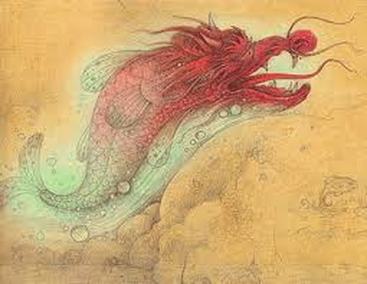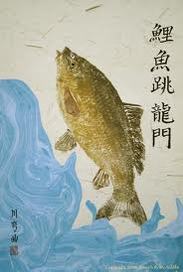Task 1
There is a Chinese proverb that goes "The carp has leaped through the dragon's gate." (lǐ yú tiào lóng mén, 鲤鱼跳龙门 )
Read the following story and answer the questions in your workbook.
a. Where is the Dragon Gate?
b. When do carp go to the Dragon Gate?
c. Why do they leap the gate?
d. What’s the symbolic meaning of lǐ yú tiào lóng mén, 鲤鱼跳龙门 ?
The carp has leaped through the dragon's gate

On the Yellow River at Hunan Province, there is a waterfall called the Dragon Gate. It is said that if certain carp can climb the cataract they will transform into dragons. Every year in the third month of spring they swim up from the sea and gather in vast numbers in the pool at the foot of the falls. It used to be said that only seventy one could make the climb in any year. When the first succeeded, then the rains would begin to fall. This Dragon Gate was said to have been created after the Flood by the god-emperor Yu who split a mountain blocking the path of the Yellow River. It was so famous that throughout China there was a common saying that: 'a student facing his examinations is like a carp attempting to leap the Dragon Gate.'
According to Chinese mythology, the Dragon Gate is located at the top of a waterfall cascading from a legendary mountain. Many carps swim upstream against the river’s strong current, but few are capable or brave enough for the final leap over the waterfall. If a carp successfully makes the jump, it is transformed into a powerful dragon. A Chinese dragon’s large, conspicuous scales indicate its origin from a carp. The Chinese dragon has long been an auspicious symbol of great and benevolent, magical power.
According to Chinese mythology, the Dragon Gate is located at the top of a waterfall cascading from a legendary mountain. Many carps swim upstream against the river’s strong current, but few are capable or brave enough for the final leap over the waterfall. If a carp successfully makes the jump, it is transformed into a powerful dragon. A Chinese dragon’s large, conspicuous scales indicate its origin from a carp. The Chinese dragon has long been an auspicious symbol of great and benevolent, magical power.

The image of a carp jumping over Dragon’s Gate is an old and enduring Chinese cultural symbol for courage, perseverance, and accomplishment. Historically, the dragon was the exclusive symbol of the emperor of China and the five-character expression, Liyu Tiao Long Men, was originally used as a metaphor for a person’s success in passing very difficult imperial examinations, required for entry into imperial administrative service. To this day, when a student from a remote country village passes the rigorous national university examination in China, friends and family proudly refer to the “Liyu Tiao Long Men.” More generally, the expression is used to communicate that if a person works hard and diligently, success will one day be achieved.